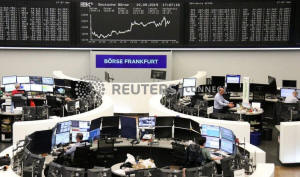Shares, bond yields perch at six-week highs
 Send a link to a friend
Send a link to a friend
 [September 13, 2019]
By Marc Jones [September 13, 2019]
By Marc Jones
LONDON (Reuters) - World shares climbed to
a six-week high alongside benchmark government bond yields on Friday, as
markets cheered signs of progress in U.S.-China trade talks and another
powerful slug of stimulus from the European Central Bank.
It was a bit of a groggy start in Europe after it emerged not all of the
ECB's member country's had wanted to restart its money printing program,
but the main bourses eventually added 0.2% to what was already set to be
a fourth straight week of gains.
The euro shuffled up to a two-week high in foreign exchange markets too,
as traders there suspected the ECB may have now exhausted all ammunition
of any worth, though a six-week low for the safe-haven Japanese yen and
the pound back above $1.24 for the first time since late July also
caught the attention.
"We have quite an interesting reaction to the ECB meeting with the sense
of the pushback from the core countries, and that essentially that the
ECB has now thrown its last cards in," said John Hardy, head of FX
strategy at Saxo bank.

"It looks like we are also getting to some pretty interesting levels for
yields. If the consolidation continues, at some point you have to
question whether the easing (from the central banks) is actually there."
U.S., Japanese and European long-dated bond yields were all at six-week
highs. Ten-year U.S. Treasuries were offering almost 1.8% compared with
just over 1.4% at the start of September, while Germany's Bunds settled
at the new ECB deposit rate of -0.5%.
It was all built on revived risk appetite and after U.S. President
Donald Trump had said on Thursday he was potentially open to an interim
trade deal with China, although he stressed an "easy" agreement would
not be possible.
It would certainly help optimism in the near future though, a new
Reuters poll showed most economists believed the trade dispute would
worsen or at best stay the same over the coming year.
In line with the main world stock indexes, Asian shares ended their week
at a six-week high. Japan's Nikkei did even better and scored a 4-month
peak, while Wall Street's S&P 500 had closed just short of its all-time
closing high.
As well as the boost from the Trump trade signals and the ECB's salvo of
easing measures, sentiment had also been helped by a U.S. tax overhaul
plan aimed at middle-income households next year.
[to top of second column]
|

The German share price index DAX graph is pictured at the stock
exchange in Frankfurt, Germany, September 10, 2019. REUTERS/Staff

"Risk assets should find further support from accommodative
policies, which are set to remain in vogue for some time, and not
just in Europe as seen in the global easing trend," said Esty Dwek,
head of global market strategy at Natixis in Geneva, Switzerland.
EASY! EASY!
U.S. Fed funds rate futures now imply a 0.25 percentage point
interest rate cut by the U.S. central bank next week but have
effectively priced out any chance of a larger cut.
The Fed will announce its policy on Wednesday, followed by the Bank
of Japan (BOJ) on Thursday.
Sources told Reuters the BOJ is leaning toward standing pat next
week if markets are calm, but is brainstorming ways to deepen
negative interest rates at minimal cost.
"I think a rally in stock prices will run out of steam soon. It's
typical buy-on-rumor-sell-on-fact trade on central bank stimulus and
will be over by the Fed and the BOJ's meetings," said Tatsushi Maeno,
senior strategist at Okasan Asset Management.
Despite the rise in other economy-sensitive assets, oil prices were
on course to post weekly losses.
As well as continued worries about weakening demand, traders have
begun speculating that the U.S. may ease sanctions on Iran after
Trump ousted his hawkish national security adviser John Bolton this
week.
Brent crude futures fell 0.25% to $60.21 a barrel while U.S. West
Texas Intermediate (WTI) crude was down 0.2% at $54.98. Gold ticked
up to $1,503 an ounce.
(Additional reporting by Noah Sin in Hong Kong; Editing by Alex
Richardson)
[© 2019 Thomson Reuters. All rights
reserved.]
Copyright 2019 Reuters. All rights reserved. This material may not be published,
broadcast, rewritten or redistributed.
Thompson Reuters is solely responsible for this content.
 |